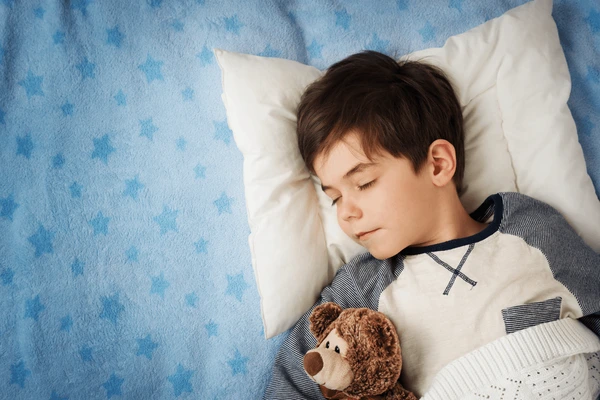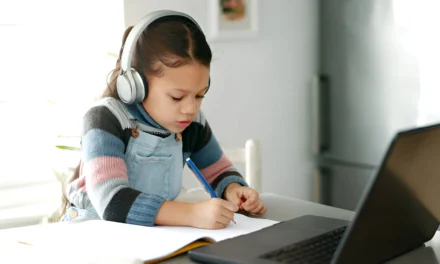As a parent, you want the best for your child’s education and well-being. Sleep is a key factor in their success. Children aged 6-13 need 9-11 hours of sleep each night1. But, many don’t get enough2.
Quality sleep helps your child’s body and mind recover. It supports brain growth and emotional control. Without enough sleep, your child might struggle with focus, mood, and multitasking12.
Key Takeaways
- Adequate sleep is crucial for your child’s cognitive development and academic performance.
- Poor sleep can lead to decreased attention, impaired memory, and reduced problem-solving skills.
- Consistent sleep routines and a sleep-friendly environment are important for establishing healthy sleep habits.
- Objective sleep measurements, such as actigraphy, provide a more accurate assessment of your child’s sleep patterns.
- Promoting sleep education in schools can help raise awareness and support for the importance of sleep in academic success.
Importance of Sleep for Academic Performance
Quality sleep is key for your child’s success in school. During sleep, the brain works hard to help with learning, memory, and focus3. Getting enough sleep helps your child stay sharp and do well in class3.
Sleep Supports Brain Development and Cognitive Functions
Sleep is vital for brain growth and improving thinking skills. Research shows students with sleep issues often get lower grades in math, reading, and writing4. A regular sleep schedule is more important than how long you sleep, studies find5.
Lack of Sleep Impairs Learning, Memory, and Concentration
Not enough sleep can mess up brain signals and make it hard to stay alert and focused3. After just two weeks of little sleep, students feel as tired as those who haven’t slept for 48 hours4. Those who stay up all night tend to have lower GPAs4.
“Each hour of sleep lost corresponds to a 0.07 decrease in end-of-term GPA.”3
It’s important to keep a regular sleep schedule for your child’s success and health.
Recommended Sleep Duration for Children

Getting enough sleep is key for kids’ brains, school work, and happiness. The National Sleep Foundation says kids aged 6 to 13 need 9 to 11 hours of sleep each night6. But, many kids don’t get enough, with 23% sleeping only 8 hours and 8% getting 7 hours or less7.
National Sleep Foundation Guidelines
The National Sleep Foundation has sleep rules for kids and teens of all ages:8
- Newborns (0 to 3 months): 11 to 17 hours of sleep per day
- Infants (4 to 12 months): 12 to 16 hours of sleep per day, including naps
- Toddlers (1 to 2 years): 11 to 14 hours of sleep per day, including naps
- Preschoolers (3 to 5 years): 10 to 13 hours of sleep per day, including naps
- School-age children (6 to 12 years): 9 to 12 hours of sleep per day
- Teenagers (13 to 18 years): 8 to 10 hours of sleep per day
Not getting enough sleep can cause problems with focus, behavior, and learning6. It also raises the chance of accidents, high blood pressure, obesity, diabetes, and depression in kids and teens6. For teens, not enough sleep can lead to self-harm, suicidal thoughts, and attempts6.
Parents, teachers, and doctors need to know and share the sleep rules. This helps kids do well in school and stay healthy687.
Consequences of Sleep Deprivation in Children
When kids don’t get enough sleep, they face many problems. Sleep-deprived children might act out more, be too active, and have trouble controlling their actions. They also struggle to focus and do well in school academically9.
Behavioral Issues and Emotional Dysregulation
Not enough sleep can cause kids to have trouble with their feelings and actions. They might find it hard to control their emotions and impulses. This can make it tough for them to get along with others and do well in class9.
Impaired Academic Performance
Sleep problems can also hurt a child’s schoolwork. Lack of sleep can make it hard for kids to pay attention, remember things, and solve problems9. This can lead to lower grades and make it harder for them to learn and succeed in school9.
Knowing how sleep problems affect kids helps parents and teachers. They can work together to help kids sleep better. This can improve their behavior, feelings, and schoolwork. Creating a respectful and equal relationship with your child is also important. It helps create a good environment for healthy sleep and growth.
Sleep and Academic Success
Research shows a strong link between sleep and academic success10. Studies reveal that better sleep quality and quantity lead to higher grades and test scores in kids and teens10. On the other hand, poor sleep is linked to lower cognitive skills and academic struggles10.
Research on Sleep and Academic Achievement
Studies have found several ways sleep helps with learning and memory10. For instance, a study found that more sleep before exams leads to better grades and GPAs11. Also, not enough sleep can make you feel less alert and less focused11.
| Key Findings from Research |
|---|
| – 54.7% of student pharmacists got less than 7 hours of sleep a night during school11 |
| – 81.7% of student pharmacists got less than 7 hours of sleep before exams11 |
| – Nearly half (47.8%) of student pharmacists felt sleepy during the day almost every day11 |
| – Longer sleep before exams was linked to better grades and GPAs11 |
| – 30.4% of Nursing students had bad sleep habits, and 47.9% showed poor academic performance12 |
| – A short sleep pattern was found in 20.2% of Nursing students, linked to poor academic performance12 |
These findings show how important sleep is for academic success. It’s crucial to raise awareness about the need for healthy sleep habits in students.
“Inadequate sleep, defined as fewer than 7 hours a day for adults, impacts cognitive performance such as decreasing general alertness and impairing attention.”11
Establishing Healthy Sleep Habits
Good sleep habits are key for your child’s school success. A regular sleep routine is important. This means the same bedtime and wake-up time every day, even on weekends13.
Make the bedroom sleep-friendly. Keep it cool, dark, and quiet. This helps your child sleep better14.
Consistent Sleep Routine and Bedtime
A consistent sleep routine is crucial for school success14. Going to bed and waking up at the same time every day helps sleep14. Don’t let your child sleep in on weekends. It messes up their sleep schedule for the week14.
Sleep-Friendly Environment
A good sleep environment is also important. Avoid bright lights and screens before bed. Also, limit caffeine to help your child sleep14.
Keep the bedroom cool, dark, and quiet. This makes it easier to fall asleep14. Relaxing activities, like a warm bath, can also help your child sleep better14.
Good sleep habits help your child get the 7-9 hours of sleep they need for school success13. These habits prevent problems like inattention and poor memory13.
“Sleep is particularly crucial for college students as it has been linked to higher academic success.”
Role of School Start Times

Many kids and teens don’t get enough sleep because of late bedtimes and early school times15. To fix this, top medical groups suggest starting school later15.
Recommendations from Medical Organizations
The American Academy of Pediatrics and others say middle and high schools should start at 8:30 a.m or later15. They say teens need 8 to 10 hours of sleep each night for health15.
Starting school later can help students sleep better and do better in school. A study in Seattle showed students got 34 minutes more sleep each night15. Students also got better grades in biology, up by 4.5%15.
Teachers also feel less stressed when school starts later, improving their well-being15.
Four school districts that delayed start times saw students’ grades go up by 0.1 points on average15. But, a 2022 survey by the Sleep Foundation showed mixed feelings from parents and teachers15.
California made a law in 2019 to keep high schools from starting before 8:30 a.m. and middle schools before 8:00 a.m. This affects about 3 million students15. New York is also considering a similar law, along with Massachusetts and New Jersey15.
While research supports later school start times, making this change can be hard. But, it could greatly improve students’ sleep, grades, and overall health151617.
Importance of Sleep Education in Schools
Schools are key in teaching kids and teens about good sleep habits through sleep education18. They teach about sleep patterns, disorders, and how sleep affects health and school work19. Studies show that school sleep programs can lead to better sleep times and habits, but more research is needed18.
Good sleep is vital for students’ minds and bodies19. Not getting enough sleep can lead to obesity, diabetes, and other health problems, as the CDC warns19. Sleep issues like ADHD, anxiety, and depression can also be linked to not sleeping enough19.
Adding sleep education to school curricula can greatly help students succeed20. Sleep is key for remembering things, staying focused, feeling good emotionally, and being creative, all important for school success20. Schools can teach students to make better sleep choices, improving their sleep quality and amount18.
But, changing sleep habits based on what students learn can be hard18. Success in sleep education depends on motivation, the right theories, and making sleep a part of the whole school effort18. Schools can work to overcome these challenges and offer effective sleep education programs18.
In summary, sleep education in schools is vital for students’ success, health, and happiness. By teaching the value of quality sleep, schools help students develop habits that will last a lifetime192018.
Sleep and Effortful Control
Children’s success in school isn’t just about sleep. It also depends on their self-control and behavior management. This skill, called effortful control, plays a big moderating role in how sleep affects their grades21.
Research shows that poor sleep hurts more in kids who struggle with self-control21. Kids who can manage their thoughts and feelings better might handle sleep loss better21. So, the link between sleep and school success isn’t simple. It depends on how well a child can control their actions and emotions.
Moderating Role of Effortful Control
Studies found that kids with strong self-control do well on tasks that need executive skills, even with little sleep21. But, this isn’t true for kids with lots of sleep problems21. This shows that both good sleep and self-control are key for kids to do well in school21.
The study also found that better sleep can help kids with strong self-control do even better21. This means that improving sleep and self-control can help kids get ready for school and do well21.
| Key Findings | Significance |
|---|---|
| High effortful control is linked to better executive functioning in children with few sleep disturbances. | Effortful control can help compensate for the cognitive and behavioral challenges associated with sleep deprivation. |
| Effortful control does not show a correlation with executive functioning in children experiencing high levels of sleep disturbances. | Healthy sleep habits and effortful control are both important for optimizing academic readiness and achievement. |
| Better-quality sleep can enhance the relationship between high effortful control and children’s executive functioning. | Interventions targeting self-regulation and sleep can be beneficial for improving executive functioning and academic success. |
“The research emphasized the potential impact of better-quality sleep in enhancing the relationship between high effortful control and children’s executive functioning.”
In summary, the connection between sleep and effortful control is key for kids’ success in school. By understanding this moderating role, we can help kids sleep well and manage themselves better. This helps them do well in school and feel good overall21.
Sleep Monitoring and Objective Measurements
Parental reports often overestimate how much sleep kids get22. To get a true picture, researchers now use actigraphy. This method tracks sleep through a wrist-worn device, giving a clear view of sleep quality and duration22.
Actigraphy is better than relying on parents because it catches all sleep disturbances. It shows how much sleep kids really get, not just what parents think.
Advantages of Actigraphy over Parental Reports
Actigraphy beats parental reports in many ways22. It shows kids sleep about 7 hours and 39 minutes on average, more than what parents say22. Most kids actually sleep less than they think they do22.
It also shows sleep patterns in detail. Kids sleep about 7 hours and 24 minutes on weekdays and 8 hours and 2 minutes on weekends22. There’s even a link between sleep and school grades22.
Actigraphy also uncovers differences in sleep timing. Kids say they go to bed at 11:14 PM, but actigraphy shows it’s really 12:06 AM22. There’s a small link between bedtime and school grades22. But wake time doesn’t seem to affect grades much22.
But, the regularity of bedtime is key. Kids who go to bed at the same time every weekday do better in school22.
In short, actigraphy gives a clear view of kids’ sleep. It helps us understand how to improve their school performance better.
Sleep and Memory Consolidation
Quality sleep is key for processing and storing memories, which are vital for success in school. During sleep, the brain works hard to make new information stick. This helps turn short-term memories into long-term ones, making it easier to learn and remember things.
But, if sleep is disrupted, it can mess up this process. This makes it harder to remember what you learned during the day23.
Studies show that sleep can boost memory by 20 to 40 percent23. Deep sleep, or Stage 3, is especially important for memory. Slow brain waves in this stage help move memories from the hippocampus to safer storage23.
REM sleep also helps with solving problems and thinking creatively23. People who wake up during REM sleep can solve puzzles 15 to 35 percent better than those woken up in other stages or during the day23.
It’s important to keep a regular sleep schedule and get enough sleep to do well in school. By focusing on quality sleep, you can improve memory, thinking, and reach your highest potential232425.
Sleep Timing and Quality
Sleep timing and quality are key to doing well in school. Sleep Timing is when you start to fall asleep. If you start later, you might sleep less. Sleep Quality is about how well you sleep, like how fast you fall asleep and how much time you spend asleep.
Studies show that bad sleep timing and quality can hurt your grades and memory. A study with 100 MIT students found that more sleep means better grades. Also, staying consistent with sleep helps more than changing it every night26
Sleep Onset, Latency, and Efficiency
Going to bed too late can hurt your test scores, even if you sleep a lot27. Sleeping after 2 a.m. can also lower your grades, even with the same amount of sleep27. This shows that when you go to bed matters a lot for your school work27.
Also, a big part of your grades can depend on your sleep habits27. This includes when you go to bed and how your sleep changes from night to night27.
Sleep and Academic Success
Sleep as a Predictor of GPA
Many studies show that good sleep quality, quantity, and timing lead to better grades. This includes higher GPAs and scores on tests28. On the other hand, not getting enough sleep is linked to lower GPAs29.
For instance, students who sleep 9 hours or more each night tend to have higher GPAs. This is compared to those who sleep 6 hours or less28. This shows how crucial sleep is for your child’s school success.
Research also shows a positive link between sleep quality and academic scores for university students29. Poor sleep quality and not enough sleep are linked to lower grades29. Also, sleeping longer the night before a test can lead to better grades29.
But, the link between sleep and school success is not simple. Some studies say high grades can be linked to less sleep. Others find no clear link29. More research is needed to understand this relationship better.
| Sleep Metric | Relationship with Academic Performance |
|---|---|
| Sleep Quality | Positive relationship with academic scores29 |
| Sleep Quantity | Negative correlation with poor academic performance29 |
| Sleep Timing | Longer sleep before exams linked to higher grades29 |
In conclusion, sleep is key for your child’s school success. Good sleep helps with memory, focus, and thinking skills. This leads to better grades and higher GPAs28. But, the exact relationship between sleep and school success is still being studied2829.
Conclusion
The importance of sleep for your child’s school success is huge. Good sleep helps their brain grow, learn, and remember things better. It also helps them control their emotions and do well in school30.
By teaching your child to sleep well, making their bedroom cozy, and ensuring they sleep 9-11 hours a night, you help them succeed in school31.
Also, teaching kids about sleep in school and starting school later can help a lot. This supports their sleep and boosts their school grades32.
Remember, making sleep a priority is a smart choice for your child’s education. Healthy sleep habits mean they can do well in school and in life.
Studies show that sleep and school success go hand in hand303132. By focusing on sleep and using good strategies, you can help your child excel in school and stay healthy.






I’m so in love with this. You did a great job!!
Thanks for posting. I really enjoyed reading it, especially because it addressed my problem. It helped me a lot and I hope it will help others too.